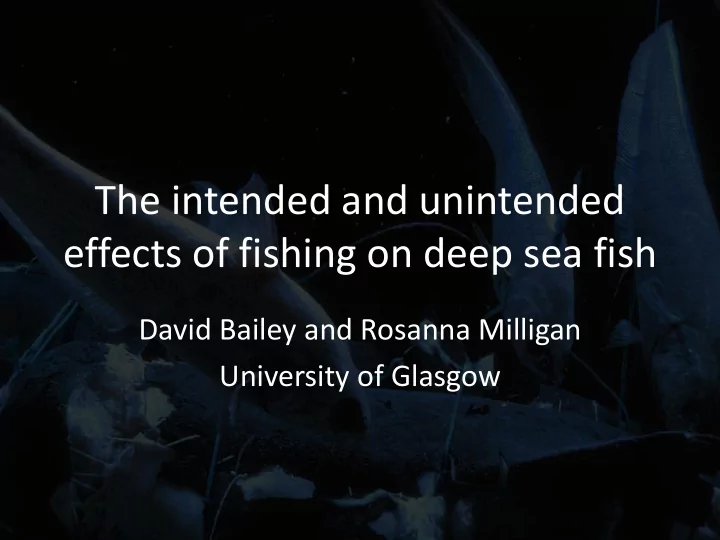

The intended and unintended effects of fishing on deep sea fish David Bailey and Rosanna Milligan University of Glasgow
Deep sea fish • Diverse • Sometimes extremely long lived • Very low survival if brought to surface • Difficult and expensive to study • Very few long term, fishery-independent surveys • Less well understood than shallow species
Case study
Trawling
Species richness 25 -1 ) Fish diversity (species trawl 20 15 10 5 0 0 1000 2000 3000 4000 5000 Trawl mean depth (m)
Abundance 35000 30000 -2 ) Abundance (fish km 25000 20000 15000 10000 5000 0 0 1000 2000 3000 4000 5000 Depth (m)
What we found • Declines occur in the majority of species, regardless of whether they are targets of the fishery • Any fish whose range falls <1500 m can be affected • Removal at <1500 m reduces their abundance across their whole range • As a result the fishery impact extends to c2500 m • No change in species/trawl but significant change in assemblage structure (relative proportions of species)
What difference would a maximum depth limit on trawling make?
Fish species exposed to fishing based on Porcupine Seabight data 120 100 Number of species within range 80 60 40 20 0 0 500 1000 1500 2000 Fishing Depth Limit (m)
Conclusions • The study of deep sea environments is difficult and expensive • Fishing adversely affects deep water fish assemblages – Abundances of individual non-target species – Overall structure of the fish assemblage • Unless provably the result of sustainable use such large changes will not be compatible with our legal obligations under the Marine Strategy Framework Directive • Limiting maximum trawling depth to 600 m would take 50 fish species out of the reach of trawling. A conservation gain of this size would be enormously expensive in other ecosystems
• NERC • European Union, FP7 and earlier Thank you • Marine Conservation Biology Institute • Colleagues at SAMS, Aberdeen, Government of South Georgia and South Sandwich Islands, Highland Statistics • Francis Neat, Marine Scotland Science • Jo Clarke, University of Glasgow • Photo credits to Oceanlab, University of Aberdeen • Ships parties, especially RRS Discovery and Challenger
Recommend
More recommend